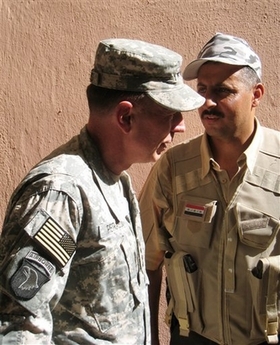Petraeus prepares troop reduction plan
Updated: 2007-08-16 15:31
BAGHDAD -- The top American commander in Iraq said Wednesday he was preparing recommendations on troop reductions before he returns to Washington next month for a report to Congress. He predicted the US footprint in Iraq would have to be "a good bit smaller" by next summer.
 General David Petraeus, the top US commander in Iraq, is seen with a member of the Amariyah Volunteers, former insurgents who have joined forces with the US and Iraqi troops to fight al-Qaida, in west Baghdad, Iraq on Wednesday, Aug. 15, 2007. [AP] |
But Gen. David Petraeus cautioned against a quick or significant US withdrawal that could surrender "the gains we have fought so hard to achieve."
He declined to offer specifics on upcoming recommendation. The report, expected next month, is seen as a potential roadmap for US military and diplomatic policies in Iraq.
Petraeus also said the "horrific and indiscriminate attacks" that killed at least 250 Yazidis, an ancient religious sect, in northwestern Iraq on Tuesday were the work of Al-Qaida in Iraq fighters. The suicide bombings occurred near the Syrian border, and US officials charge the Damascus regime has not done enough to police the frontier against infiltration by foreign fighters who dominate Al-Qaida.
The attacks, Petraeus added, bolstered his argument against moving too quickly to draw down the 30,000 additional US troops deployed in the first half of the year. US troop strength in Iraq is currently at an all-time high of more than 160,000.
The general, who wrote the Army's book on counterinsurgency, said he and his staff were "trying to do the battlefield geometry right now" as he prepared his troop-level recommendations.
"We know that the surge has to come to an end. There's no question about that. I think everyone understands that by about a year or so from now we've got to be a good bit smaller than we are right now.
"The question is how do you do that ... so that you can retain the gains we have fought so hard to achieve and so you can keep going. Again we are not at all satisfied where we are right now. We have made some progress but again there's still a lot of hard work to be done against the different extremist elements that do threaten the new Iraq."
One of most significant shifts for US forces recently has been recruiting allies among former Sunni insurgents areas such as the western Anbar Province. "A pretty big deal," said Petraeus.
"You have to pinch yourself a little to make sure that is real because that is a very significant development in this kind of operation in counterinsurgency," he added.
"It's all about the local people. When all the sudden the local people are on the side of the new Iraq instead of on the side of the insurgents or even Al-Qaida, that's a very significant change."
The general issued his comments to a small group of reporters who accompanied him to the headquarters of a group of former Sunni insurgents who are now working with American and Iraqi forces against Al-Qaida in western Baghdad's Amariyah neighborhood.
Petraeus listened intently as the so-called Freedom Fighters' 40-year-old leader, who uses the nom-de-guerre Abu Abed, explained his transformation. He said he switched sides because Al-Qaida was ravaging the neighborhood.
|
|
|
||
|
||
|
|
|
|